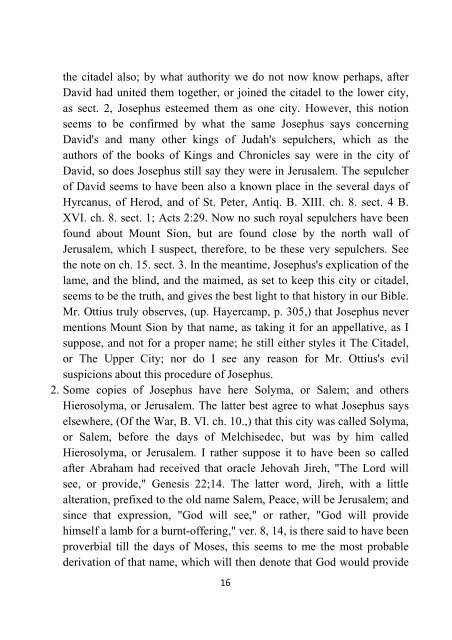You also want an ePaper? Increase the reach of your titles
YUMPU automatically turns print PDFs into web optimized ePapers that Google loves.
<strong>the</strong> citadel also; by what authority we do not now know perhaps, after<br />
<strong>David</strong> had united <strong>the</strong>m <strong>to</strong>ge<strong>the</strong>r, or joined <strong>the</strong> citadel <strong>to</strong> <strong>the</strong> lower city,<br />
as sect. 2, <strong>Josephus</strong> esteemed <strong>the</strong>m as one city. However, this notion<br />
seems <strong>to</strong> be confirmed by what <strong>the</strong> same <strong>Josephus</strong> says concerning<br />
<strong>David</strong>'s and many o<strong>the</strong>r kings <strong>of</strong> Judah's sepulchers, which as <strong>the</strong><br />
authors <strong>of</strong> <strong>the</strong> books <strong>of</strong> Kings and Chronicles say were in <strong>the</strong> city <strong>of</strong><br />
<strong>David</strong>, so does <strong>Josephus</strong> still say <strong>the</strong>y were in Jerusalem. The sepulcher<br />
<strong>of</strong> <strong>David</strong> seems <strong>to</strong> have been also a known place in <strong>the</strong> several days <strong>of</strong><br />
Hyrcanus, <strong>of</strong> Herod, and <strong>of</strong> St. Peter, Antiq. B. XIII. ch. 8. sect. 4 B.<br />
XVI. ch. 8. sect. 1; Acts 2:29. Now no such royal sepulchers have been<br />
found about Mount Sion, but are found close by <strong>the</strong> north wall <strong>of</strong><br />
Jerusalem, which I suspect, <strong>the</strong>refore, <strong>to</strong> be <strong>the</strong>se very sepulchers. See<br />
<strong>the</strong> note on ch. 15. sect. 3. In <strong>the</strong> meantime, <strong>Josephus</strong>'s explication <strong>of</strong> <strong>the</strong><br />
lame, and <strong>the</strong> blind, and <strong>the</strong> maimed, as set <strong>to</strong> keep this city or citadel,<br />
seems <strong>to</strong> be <strong>the</strong> truth, and gives <strong>the</strong> best light <strong>to</strong> that his<strong>to</strong>ry in our Bible.<br />
Mr. Ottius truly observes, (up. Hayercamp, p. 305,) that <strong>Josephus</strong> never<br />
mentions Mount Sion by that name, as taking it for an appellative, as I<br />
suppose, and not for a proper name; he still ei<strong>the</strong>r styles it The Citadel,<br />
or The Upper City; nor do I see any reason for Mr. Ottius's evil<br />
suspicions about this procedure <strong>of</strong> <strong>Josephus</strong>.<br />
2. Some copies <strong>of</strong> <strong>Josephus</strong> have here Solyma, or Salem; and o<strong>the</strong>rs<br />
Hierosolyma, or Jerusalem. The latter best agree <strong>to</strong> what <strong>Josephus</strong> says<br />
elsewhere, (Of <strong>the</strong> War, B. VI. ch. 10.,) that this city was called Solyma,<br />
or Salem, before <strong>the</strong> days <strong>of</strong> Melchisedec, but was by him called<br />
Hierosolyma, or Jerusalem. I ra<strong>the</strong>r suppose it <strong>to</strong> have been so called<br />
after Abraham had received that oracle Jehovah Jireh, "The Lord will<br />
see, or provide," Genesis 22;14. The latter word, Jireh, with a little<br />
alteration, prefixed <strong>to</strong> <strong>the</strong> old name Salem, Peace, will be Jerusalem; and<br />
since that expression, "God will see," or ra<strong>the</strong>r, "God will provide<br />
himself a lamb for a burnt-<strong>of</strong>fering," ver. 8, 14, is <strong>the</strong>re said <strong>to</strong> have been<br />
proverbial till <strong>the</strong> days <strong>of</strong> Moses, this seems <strong>to</strong> me <strong>the</strong> most probable<br />
derivation <strong>of</strong> that name, which will <strong>the</strong>n denote that God would provide<br />
16

















